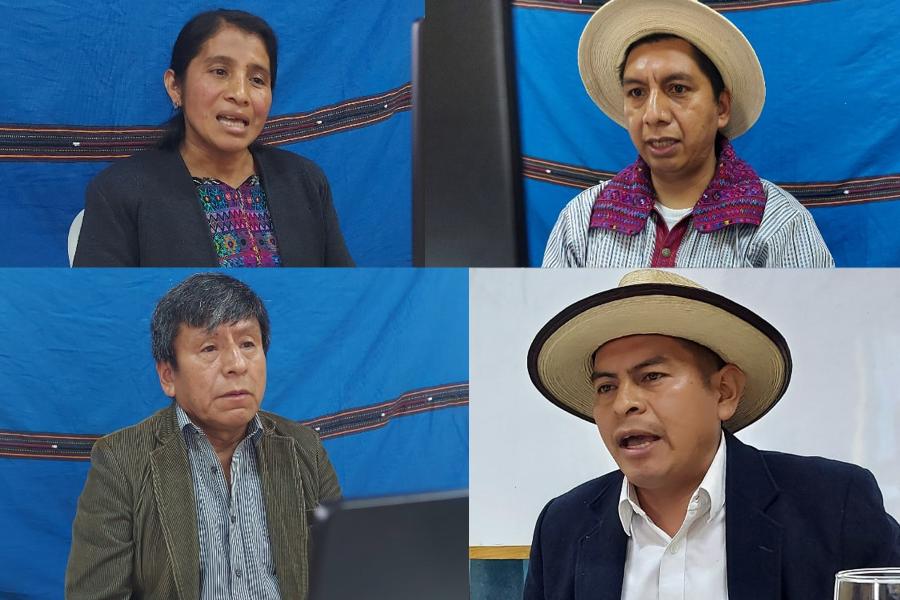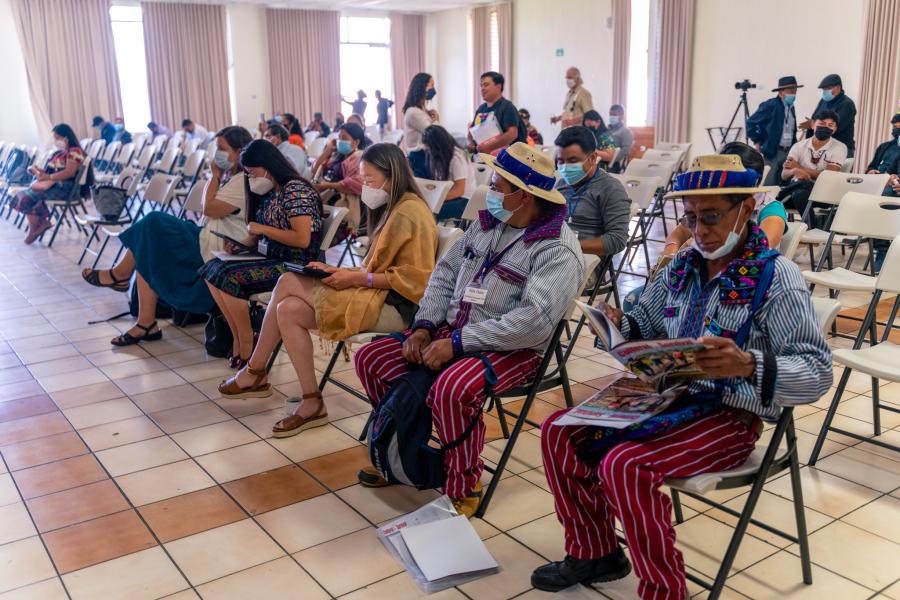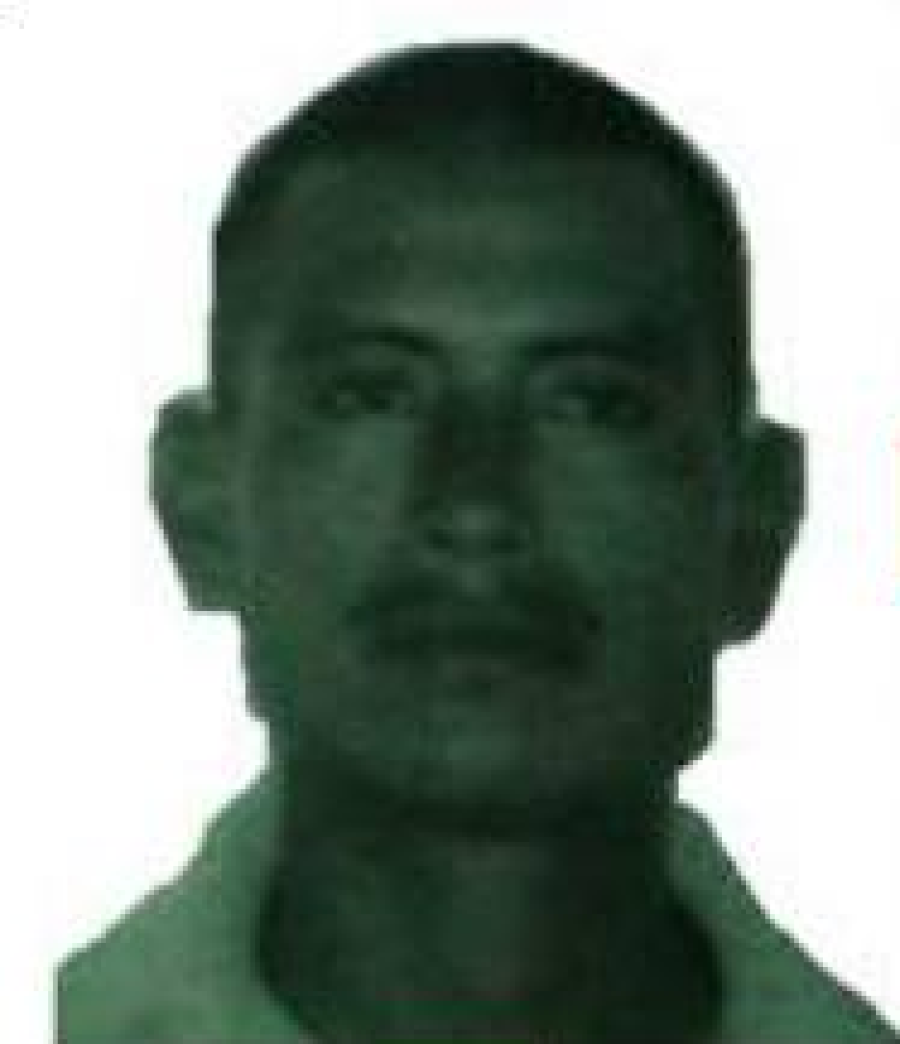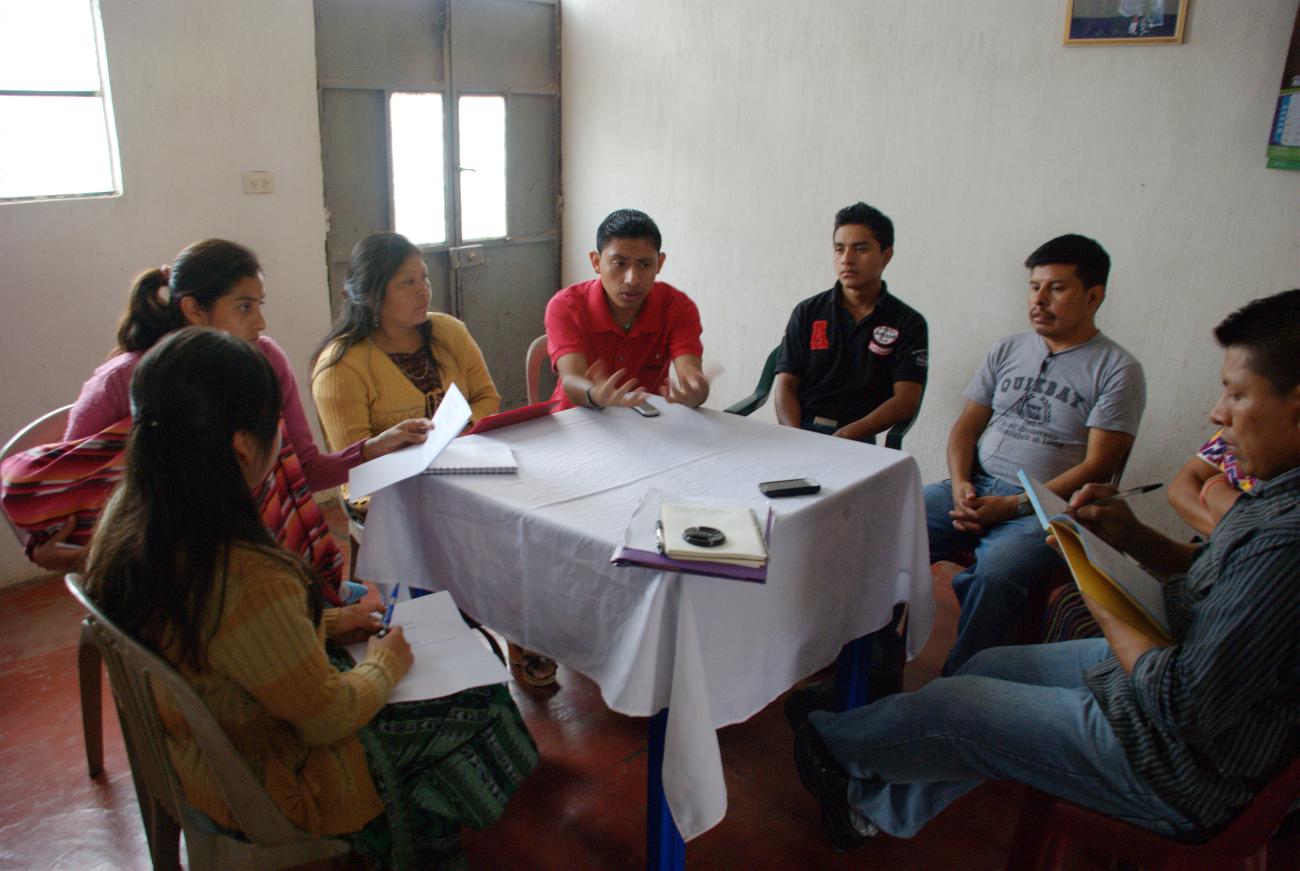
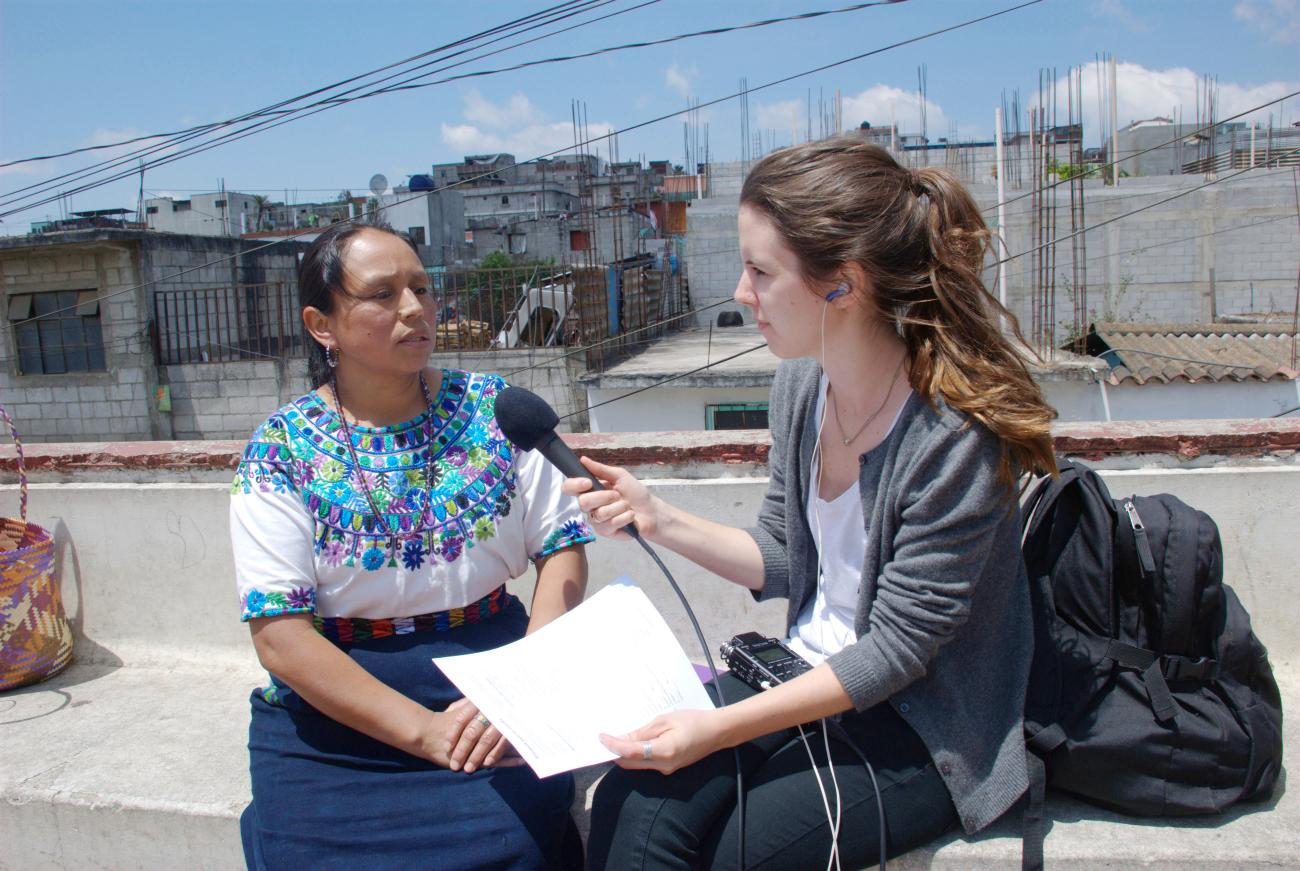
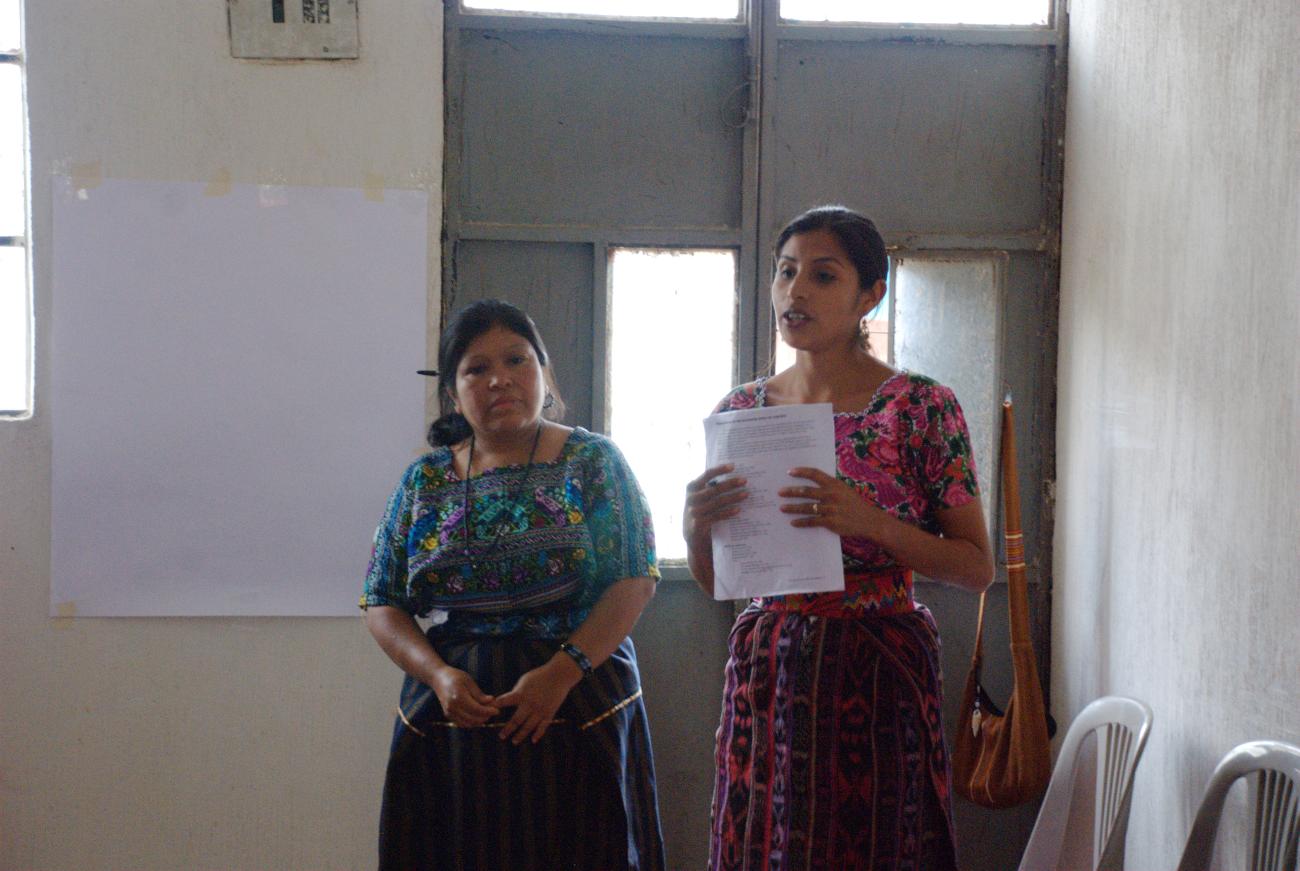
By Ryann Dear
Radio Ixchel broadcasts from a hilltop overlooking Sumpango, Sacatepequez, near a cemetery with hundreds of simple, brightly-colored mausoleums. A small antenna rising from the roof provides enough signal to cover most of Sumpango and parts of the surrounding villages, or aldeas. The outer walls of the station are teal, with a small barred window on which one can knock to be let in.
To some, the station appears to be just another building. Those close to the work being done there, however, understand its importance to local culture.
The volunteers who keep Radio Ixchel operating 14 hours-a-day provide a vital service to the community. However, despite community radio’s legality under international law, the Guatemalan government continuously challenges its relevance with national laws that deem it an illegal medium.
Last March, Radio Ixchel opened its doors to two researchers: Ryann Dear, Boston University Graduate and Research Volunteer at Cultural Survival and sister organization Sobrevivencia Cultural, and Guatemalan Anthropologist Ajb’ee Jiménez. Exploring how Indigenous peoples use and are affected by community radio, Dear and Jiménez’s goal was to create a sustainable, replicable project that would enable any community radio to assess how well their station functions, and whether or not it achieves its objectives with listeners.
Founded in 2003, Radio Ixchel is one of the longest-running, most active community radio stations in Guatemala. It has secured its role as an essential institution in Sumpango; listeners tune in to its broadcasts for news as well as political, educational, and cultural programming.
As one listener commented, “Radio Ixchel informs me, instructs me, entertains me with music…Radio Ixchel covers almost everything I need.”
The view of the listeners
The defining component of the project was a short verbal survey designed to yield listener insights.
Dear walked the streets of Sumpango, stepping into shops and knocking on doors at random.
At first, people demonstrated reluctance to speak to a young, white, female foreigner about their experiences and opinions. However, after assuring listeners of the project goals, they took the time to comment. Not surprisingly, they had a lot to say. For example:
- “[The radio has] informed me so much about what it is that I can and cannot do. Many people have learned that. To know the rights one has, one does not have to be intimidated or be afraid. Now I understand that yes, I have the right to the spoken word.”
- “They make us aware of our origin…to value our origin…to not forget who we are and where we come from. So many things happen now, a bombard of information, of other customs, other ways of thinking, other ideologies… one isn’t well-centered in their origins; they are lost. What the radio does is make the people aware of their origins.”
In addition to open-ended questions about Radio Ixchel, the survey included scale-based questions meant to evaluate the success of station objectives; participants could decide their level of agreement with phrases such as “Radio Ixchel educates me about social issues.”
In general, the survey results were extremely positive. The quality and length of responses demonstrate how highly the community values Radio Ixchel and what it does for Sumpango.
- “I like [the programming] because they promote, and have never abandoned, our cultures of Guatemala. They represent one of the symbols of our culture – the marimba.”
- “[Radio Ixchel] has helped a lot. Information that sometimes one doesn’t know, what happens in our town, there at the radio they inform us and notify us of what is happening.”
Driving change for Sumpango
In response to receiving the transcribed and tabulated results of the 50 listener surveys, Angélica Cubur, director of Radio Ixchel, said, “These surveys are extremely valuable to us…As a radio we can always improve, and this gives us the opinions of our listeners that will allow us to do that.”
For instance, to better “Raise awareness of political issues and events” and respond to listener requests for programs in Kaqchikel, the local Indigenous language, Radio Ixchel is now producing two new programs: 1) Temas y Personalidades (Themes and Personalities) to include more on-air listener opinions and generate dialogue about a theme (potentially political); and 2) Kaqchikel Pa Qacchoc (Kaqchikel in Our Home) to broadcast comprehensive lessons and promote the preservation and practice of the language.
Peer-to-peer training in Xenacoj
From the beginning, an important component of the project was the ability to be easily replicable at other radios. To ensure sustainability, Sobrevivencia Cultural awarded Radio Ixchel volunteers Elsa Amanda Chiquito, Rigoberta Gonzales, Marisol Cubur and Yennifer Choreque a grant to implement the same assessment at Radio Nacoj in Santo Domingo Xenacoj, a community radio in a neighboring village.
With Dear’s support, Chiquito and Gonzales grew quickly into their roles as project coordinators. Dear observed that, “While Jiménez and I acted as advisors in Xenacoj, our participation in the meetings lessened with time. I was extremely impressed with how confidently Chiquito and Gonzales facilitated meeting discussions and organized the different stages of assessment.”
This successful leadership sparked continual, active involvement in the project by Radio Nacoj volunteers and provided them the same hands-on learning that the volunteers at Radio Ixchel received. However, instead of learning from outsiders, Radio Nacoj volunteers were trained by their peers. For example, during survey week, members of Radio Nacoj accompanied Cubur and Choreque every day, developing effective survey techniques and gaining the confidence to approach members of the community at their homes.
Passing the assessment on to community members created a sense of ownership and pride. This, in turn, made the project both more meaningful and culturally appropriate.
Results in Xenacoj confirm project’s value and replicability
Overall, listeners spoke positively of Radio Nacoj. One listener stated, “They are people you can trust; they give us the opportunity to express ourselves and fight for the good of the community.”
Moreover, 84% rightfully believed Radio Nacoj belongs to the people. This statistic is extremely important, as it tells volunteers they have established themselves as the voice of the people.
In response to the question, “What are the reasons you listen to Radio Nacoj?” one listener proclaimed, “Because one must give priority to that which is ours.”
Similarly to Radio Ixchel, survey results and self-reflection by volunteers revealed areas in which Radio Nacoj could improve its programming to better meet its objectives. Consequently, Radio Nacoj has created two new programs: Jóvenes en Acción (Youth in Action) and Roj Ixoqí (We the Women) which respectively promote (1) youth participation in radio through creating a discussion space for topics such as education and alcohol/drug addiction, and (2) strengthening women’s political, economic, social, and cultural value within the family and society and thereby reinforcing gender equality.
As a result of the work of Dear, Jiménez, Chiquito, and Gonzalez, community radio stations in Guatemala–and, potentially other countries–now have a way to discern new and improved methods to meet the objectives that they have defined for themselves. Given the valuable insight gained, both Radio Ixchel and Radio Nacoj plan to perform a similar assessment again next year.
The Radio Nacoj Final Report included a section for suggestions and personal reflection, in which Chiquito wrote:
“This is a project that should be carried out in other radios so everyone can improve…Thanks to this study, one can realize what is missing. Personally, it helped me to put into practice knowledge I already had but hadn’t applied in my life. Now, thanks to this project, I feel accomplished as a woman and communicator to be able to manage and share my ideas with others. Also, it was a big help economically for us as volunteers, we appreciate it so much. The support of Sobrevivencia Cultural and their donors is unwavering in the fight for our native peoples.”
